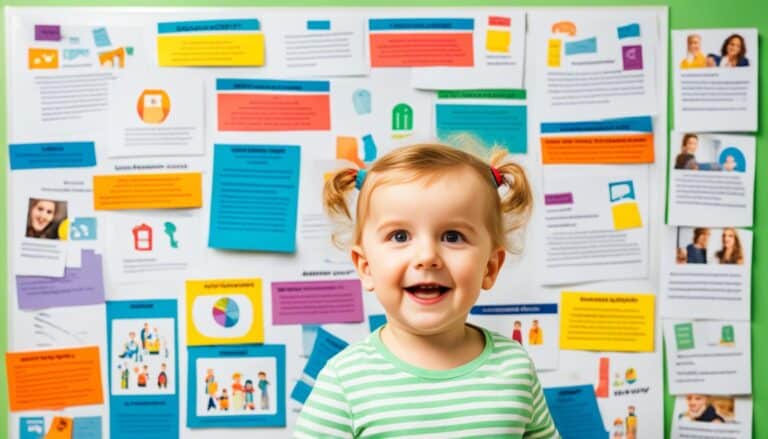Evaluating Early Childhood Programs: Standards and Successes
Early childhood programs are a vital component of a child’s education and development. As educators, parents, and policymakers, we strive to ensure that these programs provide high-quality education and promote the success of young learners. In this article, we will delve into the standards used to evaluate early childhood programs and explore some of the successes achieved in this field.
By evaluating early childhood programs, we can gauge their effectiveness in fostering learning outcomes and developmental success for children. These evaluations help us identify areas of improvement and ensure that programs meet the necessary standards for providing a nurturing and enriching educational environment.
Key Takeaways:
- Evaluating early childhood programs is crucial for ensuring quality education and developmental success.
- Standards and evaluation criteria help assess the effectiveness and overall quality of these programs.
- Successful early childhood programs have been proven to promote positive learning outcomes and reduce achievement gaps.
- Investing in high-quality early childhood programs sets a strong foundation for children’s lifelong success.
- Continuous evaluation and improvement are essential to enhance the impact of early childhood programs.
Standards for Evaluating Early Childhood Programs
Evaluating early childhood programs requires the application of specific evaluation standards and quality indicators. These standards serve as assessment criteria to determine the effectiveness, efficiency, and overall quality of a program. By evaluating various factors, which include curriculum design, teacher qualifications, learning environment, child-to-teacher ratio, health and safety protocols, and family engagement, one can ascertain whether a program meets the necessary standards for providing a holistic and enriching learning experience for young children.
When evaluating early childhood programs, it is essential to consider the following evaluation standards:
- Curriculum Design: The program’s curriculum design should align with established early childhood development principles and foster a comprehensive range of skills, including cognitive, social-emotional, physical, and language development.
- Teacher Qualifications: Highly qualified and trained teachers who possess appropriate certifications, knowledge, and expertise in early childhood education contribute significantly to the quality of a program. Teacher-to-student interactions and the use of evidence-based teaching practices are crucial in facilitating optimal learning outcomes.
- Learning Environment: A safe, supportive, and stimulating learning environment that encourages exploration, creativity, and positive social interactions is vital for a child’s holistic development. Programs should provide adequate resources, age-appropriate materials, and well-designed spaces that foster curiosity and engagement.
- Child-to-Teacher Ratio: Maintaining a low child-to-teacher ratio ensures individualized attention and supports optimal learning experiences. Effective programs enforce appropriate child-to-teacher ratios as research suggests that smaller ratios result in increased social and emotional development.
- Health and Safety Protocols: A safe and healthy environment is fundamental to a child’s well-being and learning. Programs should adhere to rigorous health and safety protocols, including maintaining proper cleanliness, implementing health policies, and ensuring compliance with relevant regulations.
- Family Engagement: Collaborating with families is critical for successful early childhood programs. Effective communication, ongoing involvement, and opportunities for parent education empower families to support their child’s learning and development effectively.

By adhering to these evaluation standards and considering quality indicators, evaluators can assess the overall effectiveness and quality of early childhood programs. The result is a comprehensive evaluation that ensures programs provide a nurturing, engaging, and developmentally appropriate environment for young children.
Successes in Early Childhood Programs
Many early childhood programs have achieved remarkable success in promoting positive outcomes for children. Research and data have shown that high-quality early childhood programs can lead to improved cognitive and social-emotional development, increased school readiness, higher academic achievement, and reduced achievement gaps.
Successful programs often prioritize evidence-based practices, individualized learning approaches, professional development for teachers, and strong partnerships with families and communities. By prioritizing these factors, early childhood programs can create a solid foundation for children’s lifelong learning and success.
“High-quality early childhood programs play a vital role in children’s development, setting them up for academic success and well-being. By implementing evidence-based practices and focusing on individualized learning, we can create nurturing environments that support children’s growth and potential.”
Positive Outcomes of High-Quality Early Childhood Programs
Here are some of the positive outcomes that have been observed in successful early childhood programs:
- Improved cognitive and language skills
- Enhanced social-emotional development
- Increased school readiness
- Higher academic achievement
- Reduced achievement gaps
| Program | Positive Outcomes | Data-driven Results |
|---|---|---|
| Head Start | Improved school readiness | Children in Head Start programs showed significant gains in school readiness skills, including early literacy and math abilities. |
| Perry Preschool Project | Long-term educational and economic benefits | Participants of the Perry Preschool Project had higher graduation rates, higher earnings, and lower rates of criminal activity compared to non-participants. |
| HighScope Perry Preschool Study | Positive societal impact | For every dollar invested in the HighScope Perry Preschool Program, there was a return of up to $17 in cost savings related to reduced special education, grade repetition, and crime. |

These data-driven results highlight the effectiveness of high-quality early childhood programs in fostering positive developmental outcomes.
Conclusion
Evaluating early childhood programs based on established standards is crucial for ensuring children’s developmental success and promoting positive learning outcomes. By assessing program quality and effectiveness, educators, policymakers, and parents can make informed decisions about which programs are most suitable for young children.
The successes achieved by high-quality early childhood programs demonstrate the importance of investing in and supporting these initiatives to provide a strong foundation for children’s future academic and personal achievements.
Through ongoing evaluation and continuous improvement, early childhood programs can continue to enhance their impact on children’s lives, leading to better developmental outcomes and brighter futures for young learners.
FAQ
What is the importance of evaluating early childhood programs?
Evaluating early childhood programs is crucial to ensure that children receive high-quality education and achieve developmental success. It helps determine the effectiveness, efficiency, and overall quality of a program.
What are the standards used to evaluate early childhood programs?
Common evaluation criteria include curriculum design, teacher qualifications, learning environment, child-to-teacher ratio, health and safety protocols, and family engagement.
What are some successes in early childhood programs?
High-quality early childhood programs have been shown to lead to improved cognitive and social-emotional development, increased school readiness, higher academic achievement, and reduced achievement gaps. They prioritize evidence-based practices, individualized learning approaches, professional development for teachers, and strong partnerships with families and communities.
Why is evaluating early childhood programs important for children’s developmental success?
Evaluating early childhood programs based on established standards is crucial for ensuring children’s developmental success and promoting positive learning outcomes. It helps educators, policymakers, and parents make informed decisions about which programs are most suitable for young children.
How can early childhood programs enhance their impact on children’s lives?
By prioritizing ongoing evaluation and continuous improvement, early childhood programs can enhance their impact on children’s lives. This involves assessing program quality and effectiveness, investing in evidence-based practices, and fostering strong partnerships with families and communities.






